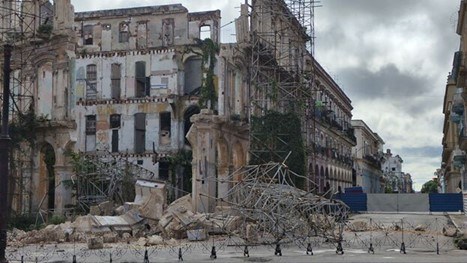
The building collapse at Zulueta 505 and the garbage heaps at the Monte and Egido portals are the field of action of those known as “piranhas” and “termites”
By Juan Diego Rodríguez (14ymedio)
HAVANA TIMES – The scavengers of Havana are happy. A mass of debris, bricks, iron and garbage has extended, since Monday, in the area of the facade of the old Vía Blanca hotel at 505 Zulueta Street. It took three months since this newspaper’s last visit to the property – then converted into a nest of thugs and drunks – for the collapse to be total.
Now, iron bars surround the collapse zone and prevent passage through the streets that surround it. The residents of the neighborhood, standing on the sidewalk of the neighboring police station on Dragones Street, launch their hypotheses: “They put the fence there in place of yellow tape because people would just lift it, duck under and keep walking.” Others, such as scavengers and criminals, continue to “explore” the ruins, trying to dodge the station’s surveillance cameras.
The decline of 505 Zulueta has accelerated in recent weeks. “The building began crumbling, and a part was closed, but finally the facade fell on the structure and destroyed it,” says one of the masons who works in the buildings on the street. Now you can’t walk there, and the neighbors complain that the ruins prevent them from going through the passage.

For the scavengers, however, the building collapses are good news. Dedicated to dismantling buildings in poor condition to reuse what is possible – rebar, sticks, bricks, nails and even dust for concrete – the craft has proliferated in a city that is falling apart. A door knocker from the 50s or the Soviet era can end up in a tenement building or in a slum on the periphery of Havana.
Any corner of the city can attest to their feats. In front of a mutilated wall on Hospital Street, a neighbor describes the scavengers: “They take anything that serves them in a particular construction. They sell anything. The walls disappear as the bricks are taken away.”
He is not wrong. On Hospital Street the plaster on the wall has been scraped away and you can see the bricks – whole and in pieces. Towards the corner, the iron structure is naked and wobbles over a gigantic garbage dump. “It won’t take long to fall,” the neighbor says.

The scavengers can be recognized by a piece of rebar or wood in their hands. Not infrequently they are, in addition, beggars or dumpster divers – digging in the garbage cans to look for food. The portals of the building located on the corner of Monte and Egido were once spacious and stately. The property functioned as an office of the state-owned Medicuba company and was abandoned a few years ago. Now, its entrance is carpeted by a formidable garbage dump.
Rummaging through the garbage, a “predator of ruins” – they are also caled “pirañas” and “termites” – explains to 14ymedio the tricks of his trade. Because of the pile of garbage and a “steel fence” that the State placed there, he cannot go inside as he would like. The mammoth building, he continues, has many useful materials, but taking them out will cost work. Rebar in hand and dodging two security cameras, the scavenger decides to enter and goes through a door whose threshold is, despite the debacle, a work of art.
In the heart of Havana, the notable buildings – almost all built during the Republic – are a species in danger of extinction. The inaction of the State and the incursions of the scavengers are destroying them until, eventually, they collapse.

The damage is irreversible in most cases. It was denounced on Tuesday by the documentary filmmaker Jorge Dalton, when he learned of the collapse of 505 Zulueta. “The painful and unhappy landscape of that area is just a small sample of the 65 years of a model more defeated than an old and patched spring mattress, useless and rusty, where everything is laziness, hopelessness, destruction and desolation,” alleged the creator, who lived for many years in Havana and now lives in El Salvador.
In 1995, Havana Historian Eusebio Leal promised the neighbors of 505 Zulueta a transfer to better houses in Alamar and Habana del Este. It took 25 years for the nine families who lived there – including children – to be relocated in 2020, in the face of the imminent collapse.
When this newspaper visited the area, in September last year, the neighbors considered it as a kind of sanctuary for criminals. Not even the police from the Dragones station dared to cross the scaffolding barrier to look for the thieves who used the ruins as a hiding place.
However, the Way of the Cross of 505 Zulueta – and of multiple buildings in Havana – has many stations left, “loose stones” that collapse on the people and garbage that now has to be collected with the help of several trucks. But in the no man’s land that Havana has become, the scavenger is king.
Translated by Regina Anavy for Translating Cuba
Read more from Cuba here on Havana Times.




